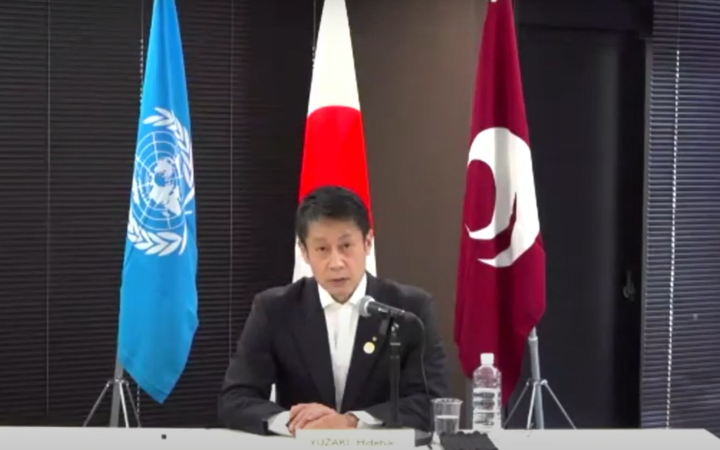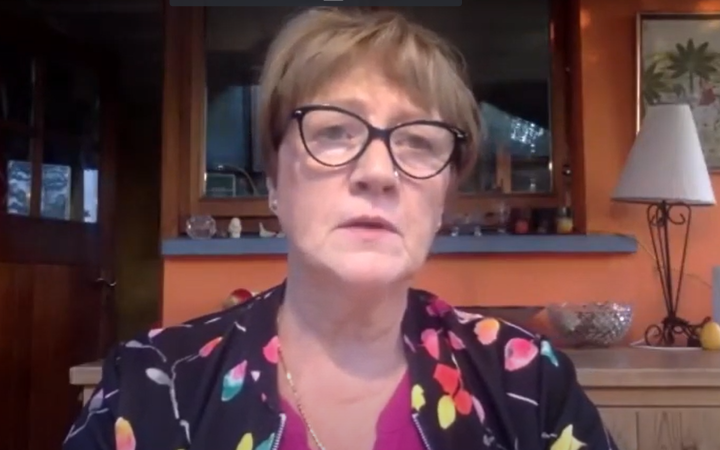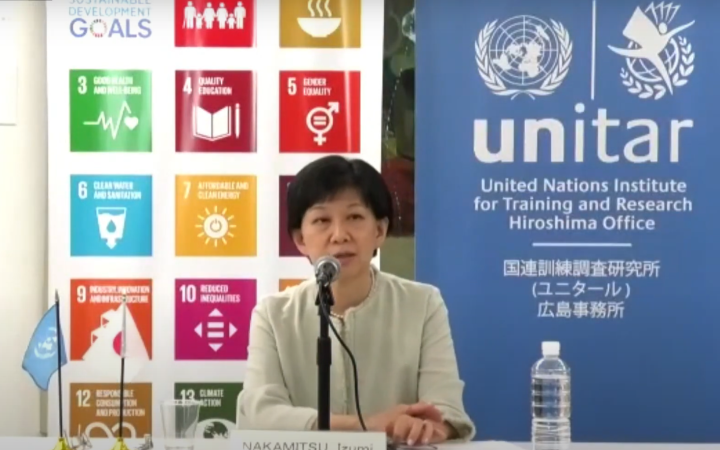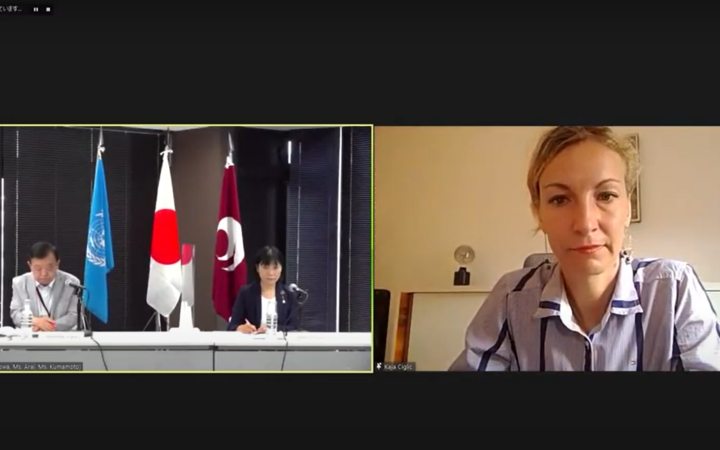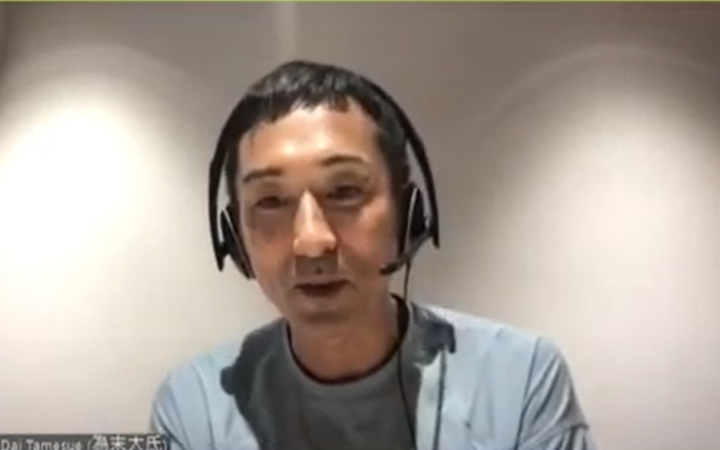- UNITAR held an online public event “Nuclear Weapon Abolishment and a Sustainable Future – A Call from Hiroshima” to commemorate the 76th anniversary of the Hiroshima atomic bombing.
- Co-organizers for the event were the United Nations Office for Disarmament Affairs (UNODA), Hiroshima Prefecture, and the Hiroshima Organization for Global Peace (HOPe).
- Panel discussions were held with representatives from the United Nations, the private sector and youth initiatives.
- Small actions by everyone in society can make big changes to achieve a world free of nuclear weapons. Engaging youth, women, civil society and the private sector are especially important.
- The world cannot achieve the Sustainable Development Goals without comprehensively addressing nuclear disarmament.
15 February 2022, Hiroshima, Japan – Over seventy-six years ago, the atomic bomb was dropped on Hiroshima, claiming tens of thousands of lives and wounding many more. Today, the city and the world still grapple with the threat of nuclear weapons. With its office in Hiroshima, UNITAR has an inherent interest in peacebuilding, post-conflict reconstruction and disarmament and promotes broad dialogue to create a peaceful and sustainable world.
To commemorate the 76th anniversary of the bombing and look to the future, UNITAR hosted a public online event on promoting the abolition of nuclear weapons, “Nuclear Weapon Abolishment and a Sustainable Future – A Call from Hiroshima.” Held on 6 August 2021, the discussion was organized with the United Nations Office for Disarmament Affairs (UNODA), Hiroshima Prefecture, and the Hiroshima Organization for Global Peace (HOPe).
Key messages
The key messages that emerged from the panel discussions with representatives from the United Nations, the private sector and youth initiatives were:
- Nuclear disarmament is deeply intertwined with the United Nations 2030 Agenda and the Sustainable Development Goals (SDGs). We will not achieve the SDGs if we do not comprehensively address nuclear disarmament.
- Global norms and international cooperation must be strengthened to sustain the momentum on nuclear disarmament and non-proliferation. The Treaty on the Prohibition of Nuclear Weapons, which came into effect on 22 January 2021, is a positive milestone.
- The international community must adopt new security systems that are independent of nuclear weapons and nuclear deterrence. Technology is advancing and changing rapidly, and we need to shift our view of security to respond to new threats such as cyberattacks.
- Multi-stakeholder processes must engage and empower diverse stakeholders including youth, women, civil society and the private sector. All of society needs to get involved in nuclear disarmament and non-proliferation efforts.
Plenary: Is a nuclear-free future attainable?
The Plenary Session focused on global collaboration to promote nuclear disarmament and global norms against nuclear weapons. Moderated by Mr. Nikhil Seth, United Nations Assistant Secretary-General and UNITAR Executive Director, the panellists brainstormed actionable steps to nuclear abolishment and building an alternative global security system to replace nuclear deterrence.
The Governor of Hiroshima Prefecture, Mr. Hidehiko Yuzaki, introduced the Hiroshima Initiative, a new call to action to reinforce commitments to create a world free of nuclear weapons. He underscored the close relationship between nuclear weapon abolishment and a sustainable future.
The use of nuclear weapons will surely destroy the global environment and social and economic foundations, causing irrevocable effects. We need to promote nuclear disarmament and seek a security system that does not rely on nuclear weapons.
Dr. Patricia Lewis, Director of International Security Programme at Chatham House registered her concerns about the extent of polarized politics and geopolitical tensions globally. While noting the opportunities and challenges brought by fast-paced technological advancement, Dr. Lewis was optimistic about strides made in international cooperation in favour of nuclear non-proliferation.
The treaty to prohibit nuclear weapons, which entered into force at the beginning of 2021, is a major long-term contribution to the nuclear disarmament agenda.
Ms. Izumi Nakamitsu, the UN Under-Secretary-General and High Representative for Disarmament, also shared her concerns on the global trends of increased military spending and lack of transparency in disarmament negotiations and discussions. She highlighted the role of the United Nations in nuclear disarmament:
We need to make sure that disarmament is positioned at the centre of those other priority agendas of the United Nations at international discussions.
Summarizing the session, Mr. Seth noted that a general paralysis on the abolition of nuclear weapons painted a bleak and complex global landscape. But he welcomed the creation of the Hiroshima Initiative, which charts a new path for the future of nuclear abolishment, where young people have a key role to play.
Partnership with the Private Sector on Disarmament
The second session focused on private-sector initiatives towards disarmament and was moderated by Ms. Mihoko Kumamoto, Director of UNITAR Division for Prosperity. The panellists were
- Ms. Kaja Ciglic, Senior Director, Digital Diplomacy, Digital Peace initiative, Microsoft
- Ms. Chitose Arai, Vice-President, JCCU (Japanese Consumers’ Co-operative Union) and Vice-Chairperson,ICA-AP (The International Co-operative Alliance Asia-Pacific)
- Mr. Yukito Minowa,CEO, TSS-TV Co., Ltd
Ms. Ciglic noted that most people want to do what is ethical, moral and right. Finding initiatives that speak to these values and demonstrating short-term quick wins can rally new voices to a noble cause.
The panellists reflected on the success of smaller projects. They agreed that filling the knowledge gap about nuclear bombings might be a starting point to develop more comprehensive partnerships with the business community to address nuclear disarmament.
The Youth Initiative
The third session, moderated by two UNITAR trainees, Mr. Kazuma Sugano and Ms. Riko Akai, focused on youth initiatives for nuclear disarmament.
UNITAR Goodwill Ambassador Mr. Dai Tamesue opened the session by sharing his own story of growing up in Hiroshima and searching for an answer to sustainable peace. He called on young people to be true to themselves and do good – they are the least everyone can do to contribute to a peaceful and sustainable society.
A panel discussion followed, featuring youth representatives who talked about their community initiatives for disarmament and peace:
- Christelle Barkat, UN Youth Champion for Disarmament/Youth4Disarmament
- Kosei Kusunoki, Hiroshima Peace Messenger
- Koichiro Ochiai, SDGs-SWY
- Yuka Okuma, Nagasaki Peace Messenger
- Sora Uchino, a representative of [50cm]
The youth panellists emphasized that everyone can start with small but creative actions in everyday life to contribute to peace and the SDGs.
The session concluded with Mr. Tamesue expressing his enormous confidence in the youth’s ability to bring about concrete change.
UNITAR Division for Prosperity and its Hiroshima Office has run the UNITAR Hiroshima Training Programme on Nuclear Disarmament and Non-Proliferation since 2015. Financially supported by Hiroshima Prefecture and Hiroshima City, the programme has helped enhance the negotiation skills of government officials for nuclear disarmament. The programme’s next round will start in February 2022.


